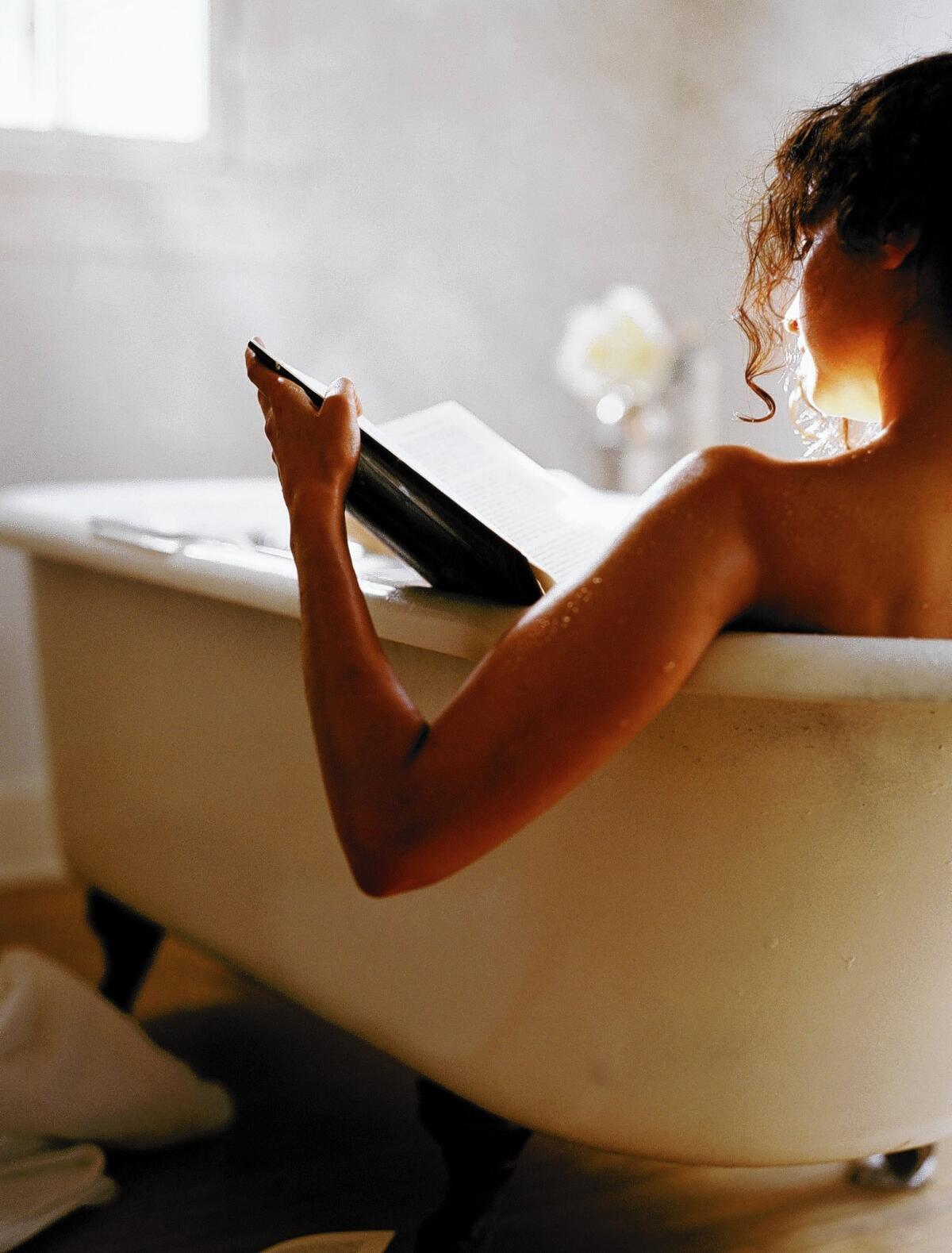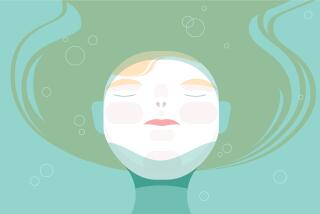Soak your cares away — it’s terrific and scientific

- Share via
In this hyper-fast, crazy-overscheduled, stress-inducing, 24/7 plugged-in reality, baths seem indulgent, even quaint, conjuring images of 19th century paintings of women with their hair swirled high atop their heads in old-timey tubs pouring pails of heated water about them.
But a bath may be just what the doctor ordered.
“America is a fast-moving society. We have fewer holidays and vacation time than, for example, Europe, and because of technology we’re always on the clock,” says Ole Henriksen, owner of the eponymous skin care line and West Hollywood spa where he incorporates Japanese bathing rituals. “Bathing rituals have been part of societies throughout history. … You’ll actually discover that a lot of answers come to us during these quiet times.”
“Thirty minutes, or whatever it’s going to be, of relaxation can profoundly affect how you’re going to deal with the rest of your day,” says Dr. Michael R. Irwin, director of UCLA’s Cousins Center for Psychoneuroimmunology, Semel Institute for Neuroscience and the Mindful Awareness Research Center. More research is needed to understand exactly what an aromatherapy bath might accomplish, he says, but there are benefits to stillness in the moment.
“When you become present in the moment, a profound relaxation occurs. It actually resets your physiology, regulates some stress hormones, helps with concentration and reduces tension,” says Irwin, who is part of a collaborative group researching integrative medicine drawing from East/West approaches.
Irwin and other experts say time in the bathtub, with the right additions to the water, also can help lull people toward sleep, ease problems like eczema, promote silky skin and soothe sore muscles.
“I love the concept of aromatherapy,” says Dr. Peter Lio, clinical assistant professor in dermatology and pediatrics at Northwestern University Feinberg School of Medicine and co-founder of the Chicago Integrative Eczema Center. “Many patients, even when their skin problem is better, still use essential oils because they love the way it makes them feel and is a wonderful way to help them sleep better.”
Lavender essential oils seem to relax people, and eucalyptus oil can ease bad coughs, Lio says. He recommends putting it in the shower steam too. “It’s energizing, activating and smells wonderful.”
There’s even a name for bath therapy, balneotherapy.
“Many natural springs and hot baths have minerals such as magnesium and calcium salts,” he says. “Epsom salts are magnesium salts and have long been used to soothe sore muscles. Although these are pretty safe, for some patients, these salts can irritate open wounds, cracks, or cuts which are not uncommon in eczema.”
But for people with dry, sensitive and inflamed eczematous skin, a bath can wash off the allergens, irritants and bacteria that collect on the skin, Lio says.
He likes using oils in the bath, particularly sunflower seed oil.
“Even a diluted bleach bath can help eczema,” says Lio, adding that diluted apple cider vinegar baths are another antimicrobial option. “Oatmeal baths are an old remedy that has very good science behind it: The oatmeal has anti-itch and anti-inflammatory properties as well. A tar-based bath oil (such as Cutar) can also be very soothing and anti-inflammatory.”
Bubble baths — fun for kids or luxurious for adults — are generally safe for people with normal skin, Lio says. “But if your skin is dry, the detergent making those bubbles can be drying and damaging,” and some people are allergic to the fragrances in many products. Even bathing in plain water — and very hot water is worse — can dry the skin by stripping it of some natural oils, so it’s best to be sure to apply moisturizer afterward.
But for severe dry skin, bathing frequently, Lio says, “sometimes even two or three times per day, can actually help tremendously. The secret seems to be using only the smallest amount of mild skin cleanser, avoiding true soaps completely, adding oils to the bath (sunflower seed oil helps greatly) and moisturizing right afterward while the skin is still damp to seal the water in the skin.”
Tips for the tub
Convinced that taking a bath might at least make you feel readier to face the world? Here are some tips.
For Dr. Peter Lio’s “dilute bleach bath,” use regular strength (6%) bleach, not concentrated bleach. For a full bathtub of water, use 1/2 cup of bleach. For a half-full tub of water, add 1/4 cup of bleach. For a baby or toddler bathtub, add 1 teaspoon of bleach per gallon of water. Pour the bleach into the water as the tub is filling and before anyone steps into it. Don’t apply bleach directly to the skin. Spend at least 10 minutes in the bath. Dry off afterward and, if applicable, use eczema medication, then moisturizer.
Consult a dermatologist before using bleach baths.
The American Academy of Dermatology has a video on bleach bath therapy for eczema: https://lat.ms/1hK1aYC.
For the apple cider vinegar bath, mix 1 or 2 cups of vinegar in a full tub. Soak for about 10 minutes. Rinse with fresh water. This can be done two or three times a week.
Ole Henriksen recommends soaking in a bath at least once a week to quell common upper back and shoulder tension. To replicate the spa bathing experience at home, he suggests indulging with candles, calming refreshments, soft music and a rolled-up towel for neck support. Add Epsom salt to help take out the body’s stress and strain, a cup of powdered milk and your favorite essential oil blend, he says. Henriksen uses lavender to calm, and rosemary and eucalyptus for aching muscles. Soak, close your eyes, meditate, relax.






